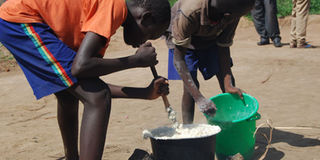Waning hope for west nile Juvenile remand home

Some of the South Sudan refugee children in Siripi camp in Arua District. War is one of the causes of juvenile crime. PHOTO BFELIX WAROM OKELLO
What you need to know:
In the ideal world, child offenders are supposed to be sent to juvenile correctional centres. Unfortunately, this is not the case in West Nile.
WEST NILE
The juvenile justice system is to rehabilitate children, and not punish them over criminal behaviour. The presumption of their naivety demands that safety is given to them and all is done to reduce their delinquency.
As international obligations and national statutes prescribe, these commitments must be pursued through means that are fair, just and recognise the unique characteristics and needs of juveniles.
Those who violate the law need to be held accountable. However, incarceration deemed to do further damage to juveniles is prohibited, at least by the United Nation’s Convention on the Rights of the Child.
African states equally bound themselves to this human rights regime with the adoption of the African Charter on Human and Peoples’ Rights in 1990 and the African Charter on the Rights and Welfare of the Child (African Children Charter). In Uganda, the Children Act 1997, is explicit on rights and handling.
This must have been the hindsight with which West Nile leaders and civil society organisations acted to lobby for the construction of the only juvenile remand home in the region.
The need for homes
Juvenile homes are few in this country, the reason local leaders and parents looked forward to the project. This, they hoped, would end the situation where juveniles (aged seven to 18 years) are detained with adults either at police or in prisons.
Here, influence from adults with worse vices than theirs, turns them into hard core criminals. Sadly, this is the situation in West Nile.
Juveniles are jailed with adult criminals in police cells and prisons. All they have are experiences of overcrowding, unhygienic conditions, absence of counsellors, and sometimes, sexual abuse by older inmates.
The rehabilitation seems to have taken a backseat. The incomplete Giligili remand home on the outskirts of Arua town, is cause for residents and human rights activists to believe so. The home which should have been used for rehabilitation of children is bushy and abandoned for termites, goats and cows to graze.
The project, which was undertaken by the Ministry of Gender, Labour and Social development, is disused yet juveniles have no rehabilitation home. Ironically, at the start of the construction of the Shs975m Juvenile Remand Home in Arua, the prisons authorities opposed the construction claiming that the land belonged to them. The issue was later resolved paving way for progress of the project until it stalled without explanation.
Juvenile offenders in West Nile are taken to remand homes in Gulu or Kampala. However, because of transport cost limitations at police stations, the children are locked up in adult prisons. Arua District Probation officer, Jackson Adriko, says when a child is arrested, the police has the discretion to caution and release the child or dispose off the case without formal court procedure.
“However, this rarely happens because police officers do not always inform the child’s parent or guardian when they are arrested,” Adriko noted. He said this year alone, 15 juveniles have been tried in court with 10 cases disposed off and the children handed back to the parents.
He added that, in some cases, parents or guardians are scared to accompany their children to police stations, for fear that they too could be arrested.
As a consequence, children appear in court unaccompanied and the magistrate is forced to deny them bail and remand them.
Johnson Abic, the district programme officer for African Network for the Prevention and Protection Against Child Abuse and Neglect (ANPPCAN), said the remand home is necessary for education, vocational programmes, individual counselling, community service, recreational activities, guardians’ visit and medical care for the juvenile offenders.
The Children Act 1997 sets out that remand in custody should not exceed six months in the case of an offence punishable by death (if they were an adult) and should not exceed three months in the case of any other offence. The majority of children are not remanded beyond the time limits. However, a minority, mostly charged with capital offences, are being remanded for a longer period.
Juvenile correctional system
Uganda performs well internationally in terms of its approach to children in conflict with the law. It has ratified the main international treaties, domesticated key principles and embedded them in the Uganda Children Act cap.59, which includes a comprehensive outline on handling the rights of such children.
A child in Uganda is one under 18 years and the age of criminal responsibility is 12 years. However, as less than four per cent of children aged between 12 and 18 have birth certificates, determining a person’s age can be a subjective process.
In order to establish the age of children, the police contact their parents, assess appearance or check the children’s teeth. As a result, remand homes and the national rehabilitation centres felt they had housed young people outside of the appropriate age boundaries.
At remand homes, juveniles are given psychotherapy. The homes have provisions for facilities like classrooms, playground and separate hostels for boys and girls.
While in rehabilitation centres, juveniles are counselled by the care-takers, exposed to religion and given life skills. But, on reintegration into their families and society, one wonders whether they learn too much and forget so fast what they get from rehabilitation centres. After few days of reintegration, some juveniles resume their previous deeds and end up in detention again.
Nonetheless, the remand home remains necessary for such offenders. Short of it, a region such as West Nile and indeed the country, risks losing a whole generation.




